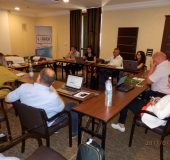Representatives of the County at the workshop in Italy within the LADDER project

In the Italian city of Cagliari, from July 12th to 14th, the workshop “Public Private Partnership and Sustainability – Challenges for Local Development and Tourism” was held within the LADDER project.
It is a project in which the partner is Croatian community of counties, and workers of its members participate in project activities. The workshop was conducted as part of the working package of the project related to the transnational working group “Public Private Partnership for Development”.
Representatives of partners from several european countries participated who are included in the activities of this working group. The Croatian community of counties at the workshop was represented by the head of the working group for the Republic of Croatia Vladimir Šadek from Koprivnica Križevci County and Mateja Cah from the VIDRA Development Agency of Virovitica Podravina County.
The workshop was an opportunity to present examples of good public private partnership practice from participating countries, as well as to consider new development opportunities for community development. The discussion was focused on topics of local development focused on tourism development by including non-material cultural heritage, as well as on the possibilities of financing of projects with this theme from EU funds.
This topic was particularly interesting for Koprivnica Križevci County, which has applied a project to use the resources of intangible cultural heritage on the Interreg Danube programme, and also were discussed the possibilities of joint project application involving partners connected through LADDER.
In the LADDER project participates 6 partners and 20 associates from 18 EU member states and 17 non-member countries. The project is based on a DEAR approach that advocates education on development and awareness-raising, with the aim of strengthening the local authorities for their role in sustainable development processes and in achieving active participation of the citizens.


